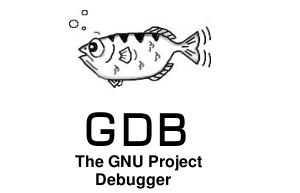### GDB
- GDB (The **G**NU **D**e**b**ugger) is a general purpose debugger
GDB cheat sheet and useful stuff
- You can hit enter to execute the previously executed command
- Auto complete and command history using arrow keys usually works fine
- Make sure to add
-DDEBUG and -ggdb options when compiling your code
- Basic usage: (1) run gdb, (2) set breakpoints then (3) run program
gdb <app_name_here>(gdb) break <file_name_here>:<line_number_here>
(gdb) run
r <app command-line arguments>
Create a .in command file
- Call commands file:
gdb --command <gdb_commands_file_here.in>
- .in commands file example:
# You can add commends to the filelike this
file ./<bin_executable_app_here>
break main
directory ./.
set print pretty on
set print union on
set print array on
set print array-indexes on
set args -t 60
GDB Commands
All these commands ca be executed once gdb is already running
Running and stepping
run or r: Run the currently opened executablestep or s: Execute next code line entering function callsnext or n: Execute next code line skipping function callsfinish: Continue running until the function that is currently being executed returnsuntil <line_number>: Run until a line number in the current contextuntil <file_name>:<line_number>: Run until a line number in the given filecontinue: Continue program executionquit or q: quits/exits GDB
Breaks
break <file_name>:<line_number>: Set breakpoint in a certain line number of a certain file
info breakpoints : Shows status and info of current breaks/breakpoints.enable/disable <break_number>: Enables or disables a breakpointdelete <break_number>: Removes a breakpoint
Display, print and other
print <variable_name> or p: Prints variable contents, the variable can be of any type
- Ex.
print MyVariable
- Ex.
p/x MyVariable : print in hex
set var <variable_name>=<value>: Set variable to the given value.
- Ex.
set var MyVariable=0x10
backtrace or bt: Prints function backtrace/callstackdisplay <variable_name/expression>: Adds variable/expression to the items that are displayed every time execution stops
info display: Shows list and status of display itemsinfo locals: Shows list of local variablesdelete display <display_num>: Removes variable/expression from the items that are displayed every time execution stops
